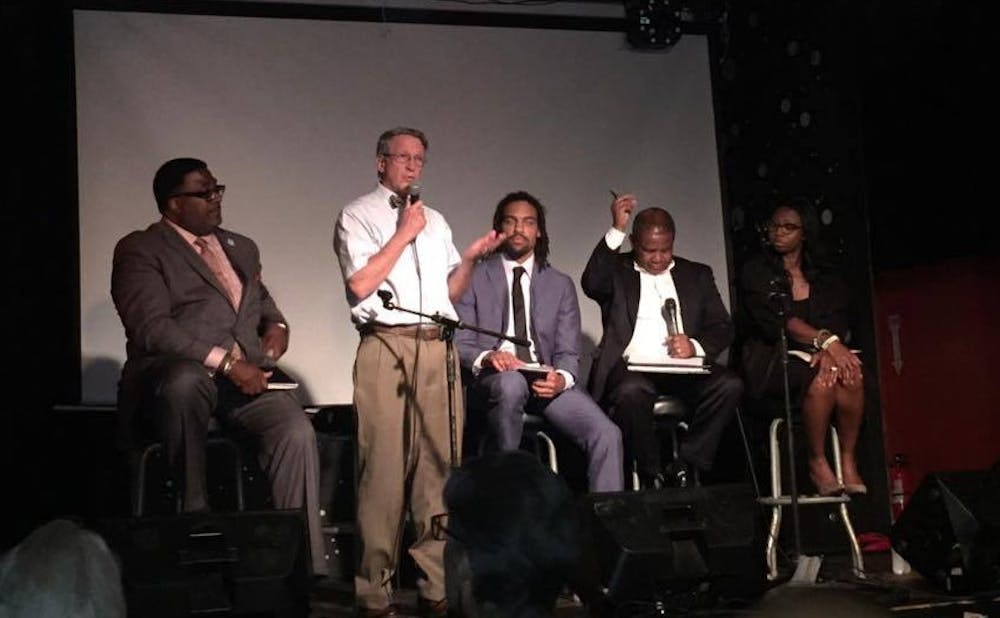For six terms Bill Bell has served as mayor of Durham, but since he is not running this November, the city will elect its first newcomer to the position in sixteen years.
Five candidates looking to take on the position appeared on stage Wednesday night at the Pinhook in downtown Durham. The topic at hand was policing—an issue that has become a point of community conversation amid controversy over body cameras, the new Durham police headquarters and the exit of the prior police chief. The candidates weighed in about how they would aim to rebuild trust between the community and police officers.
“The subject of policing is important because we understand that policing has a history in our community, particularly of being a group of people that we feel like we are not connected to,” said Farad Ali, a business consultant and former city council member. “We have our chance now with this election and also I believe with our current police chief to really build around our community police department.”
Each of the five candidates—Steve Schewel, a Durham county commissioner and Sanford School of Public Policy professor, Pierce Freelon, an African American Studies professor at the University of North Carolina at Chapel Hill, Reverend Sylvester Williams and Shea Ramirez, a tax preparer and entrepreneur, and Ali—sat on stage facing a packed bar where seating room ran out.
The candidates outlined their opinions on the practices they felt the city should adopt in order to strengthen the police’s relationship with community members.
Schewel, who has served on the Durham City Council since 2012, noted that as mayor he hopes to continue what he sees as positive steps the city has taken in policing—including the appointment of liaison officers in Northeast Durham, LGBTQ+ and hispanic communities, misdemeanor diversion court for drug offenses and the ceasing of traffic check points. He also mentioned that the city should improve its crisis intervention training to prevent young people from dying at the hands of police in situations that may be de-escalated through personal conversations.
“We need to support trust building measures,” Schewel said.
Other candidates also touched upon trust. Ali noted that the task of trust building begins with acknowledging there is a problem and making sure the community knows that the police's role is to protect and serve.
Freelon said that the issue needs to be framed as a conversation about public safety, rather than policing, because no one’s vision of safety includes the Durham Police Department. He mentioned the need to combat "gross racial disparities" through the use of tactics like trauma-informed care, clean slate clinics and misdemeanor diversion programs.
Later, Freelon encouraged the audience to think about what trusting relationships look like, asking the people present to close their eyes and imagine a feeling of safety. After the exercise, members of the audience shouted out ideas they envisioned, such as mothers’ arms and trees.
Both Williams and Martinez noted that personnel within the department is a key part of making relationships stronger.
Williams suggested greater incentives for police officers such as salary increases and promotions in order to improve the sense of accountability within the department and maintain effective personnel through diligence.
“We have people in office who tend to look the other way,” Williams said.
Effective communication should be a key practice for officials, Martinez said, noting that the city is in need of effective leadership among local officials. She suggested having greater officer involvement with the community through forums and town hall meetings.
Schewel said that how Durham is policed is "critically important" in terms of the city's inclusiveness.
“Will the city we love be a city for all?” he asked.
Several additional town hall meetings will take place prior to the mayoral election, focusing on a variety of topics. This event was part of the Mayor Up! series sponsored by Clarion Content and Heather Cook. The series will feature three additional conversations on local policy issues, with affordable housing next up.
Get The Chronicle straight to your inbox
Signup for our weekly newsletter. Cancel at any time.

